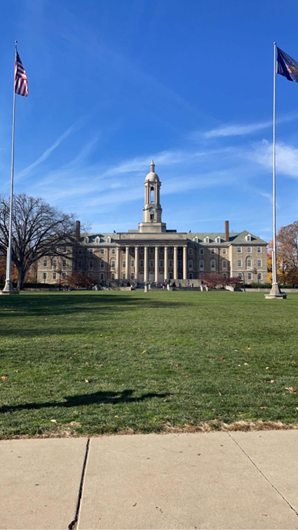Adopt Don’t Shop: Thousands of Lives Are At Stake

Izzy who was adopted from the Bucks County SPCA
Bringing a dog into your family can feel like a new family member, but there are also many issues that go on behind the scenes. Throughout history, dogs have been our loyal companions that have been treated as if they were family. However, there is also a darker side to getting a dog, that being the business that is puppy mills. Puppy mills have proven to be an unethical business, but it still remains a profitable business.
Puppy mill practices create an unethical business that feeds off of profit, with little care or regard for the dogs. The problem with puppy mills is that the dogs are seen as means for profits, not dogs. Someone who adopted his dog, Liam McLaughlin, also agrees that these puppies are “used like products” to gain mass profits. This desire to maximize profits creates an environment that is not suitable for any dog, with their being lack of cleanliness, lack of food, and especially lack of care for the dogs. The goal of profit also inspires poor care and treatment for the dogs. Many of these dogs do not receive medical treatment and instead are forced to suffer in their cramped environment. Puppies are also often taken away from their mothers at a far too young age, which can lead to many more issues.
Puppy mills can have harmful effects on puppies that grow up within them as well. The environment that puppies grow up in can have lifelong effects on them. In these cramped environments, diseases can be spread amongst animals due to poor sanitation. Some examples of commonly spread diseases are respiratory diseases, rodent-borne illnesses, ammonia burns, infections, and worms. This can lead to the death of some animals at puppy mills. Additionally, dogs can develop poor temperaments since they are usually unfamiliar with living in more open conditions and therefore can be timid. With the lack of socialization skills, some can develop aggression since they are unfamiliar with life outside the mill. Often as a whole, weaker puppies are the result of puppy mills. Puppies are often kept from pre-natal care and mothers are usually not provided with what they need during their pregnancy. Puppies are also often also removed too early from their mothers, which leads to them not having enough bonding or mother’s milk that helps them grow stronger. Malnourishment can cause many issues in puppies such as starvation, bone growth issues, vulnerability to infections, and a weaker immune system.
Overall, puppy mills are not healthy environments for puppies to grow up in. Jayne Lafty, a volunteer at the Bucks County SPCA animal shelter, adopted her dog instead of going to a puppy mill. “I started volunteering because I got my dog Izzy from a shelter as well! As I grew up I learned about how shelters are sometimes overlooked by people who want “purebred” dogs but at the end of the day, a loving dog is a loving dog. Adopting is so amazing to give an animal a chance to have a new and welcoming home. They come from a variety of backgrounds and they all deserve the best future”, says Lafty. There should be more information shared with the public on the poor conditions that dogs go through at puppy mills. So the next time you are thinking about adding a new member to your family: adopt, don’t shop!
Shreya Tripathi, Grade 12. Interests/hobbies include Key Club, Executive Council, NHS, Mini-Thon, S.U.F.A, Red Cross Club, Build-On, volunteering at the...
Noah Wolf, Grade 12. Interests/hobbies include animals, volunteering, video games, hanging out with friends and family, relaxing. Noah plans to attend...









